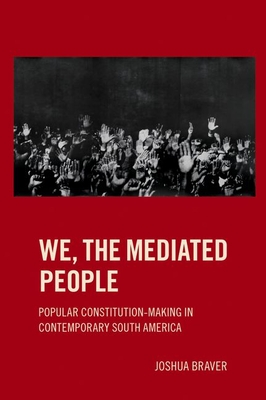We the Mediated People: Popular Constitution-Making in Contemporary South America

We the Mediated People: Popular Constitution-Making in Contemporary South America
The "people" are the ultimate source of authority for a constitution. But who are the people? The danger is that populist leaders will define the people as one segment of the population that is unbound by law to create a new constitution that centralizes power in the leader's hands. This book retells the story of popular constitution-making in South America to develop an alternative theory of the relationship of the people to law. Braver examines how and how not to violate law to construct an inclusive people so they may realize their freedom to break with the past but still stave off the establishment of semi-authoritarian constitutions. Through the "extraordinary adaptation" of old institutions, the people and its constitutional convention may include all parties. Rather than overthrowing old institutions and opening a legal void, in extraordinary adaptation, the revolutionary party gains offices through democratic elections and then repurposes the old regime's institutions by bending, reinterpreting, and even breaking their rules. However, it never creates a legal vacuum, and this partial legal continuity facilitates the participation of old parties that continue to hold some power in the previous constitution's institutions. The adaptation must be principled: the revolutionary must first exhaust all legal channels, openly acknowledge the violation to seek popular vindication, and concede enough to the opposition so that it may begrudgingly acquiesce to the new constitution. The book develops the theories of constitution-making by examining all four instances of popular constitution-making in contemporary South America. It shows how populist leaders in Venezuela and Ecuador established semi-authoritarian constitutions through lawless constitution-making while Colombia and Bolivia managed to avoid the same fate by engaging in extraordinary adaptation.
PRP: 971.85 Lei
Acesta este Pretul Recomandat de Producator. Pretul de vanzare al produsului este afisat mai jos.
874.66Lei
874.66Lei
971.85 LeiLivrare in 2-4 saptamani
Descrierea produsului
The "people" are the ultimate source of authority for a constitution. But who are the people? The danger is that populist leaders will define the people as one segment of the population that is unbound by law to create a new constitution that centralizes power in the leader's hands. This book retells the story of popular constitution-making in South America to develop an alternative theory of the relationship of the people to law. Braver examines how and how not to violate law to construct an inclusive people so they may realize their freedom to break with the past but still stave off the establishment of semi-authoritarian constitutions. Through the "extraordinary adaptation" of old institutions, the people and its constitutional convention may include all parties. Rather than overthrowing old institutions and opening a legal void, in extraordinary adaptation, the revolutionary party gains offices through democratic elections and then repurposes the old regime's institutions by bending, reinterpreting, and even breaking their rules. However, it never creates a legal vacuum, and this partial legal continuity facilitates the participation of old parties that continue to hold some power in the previous constitution's institutions. The adaptation must be principled: the revolutionary must first exhaust all legal channels, openly acknowledge the violation to seek popular vindication, and concede enough to the opposition so that it may begrudgingly acquiesce to the new constitution. The book develops the theories of constitution-making by examining all four instances of popular constitution-making in contemporary South America. It shows how populist leaders in Venezuela and Ecuador established semi-authoritarian constitutions through lawless constitution-making while Colombia and Bolivia managed to avoid the same fate by engaging in extraordinary adaptation.
Detaliile produsului









